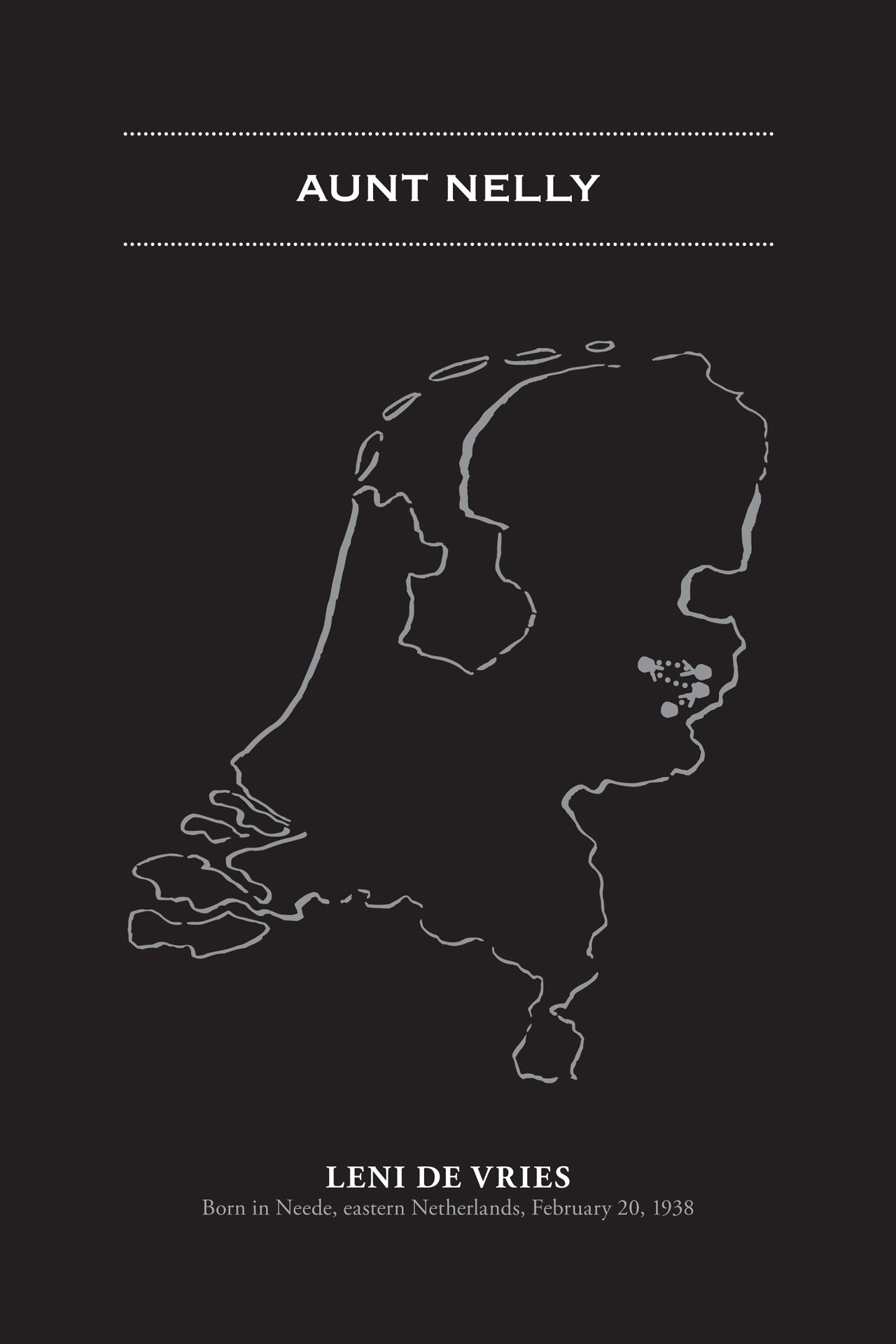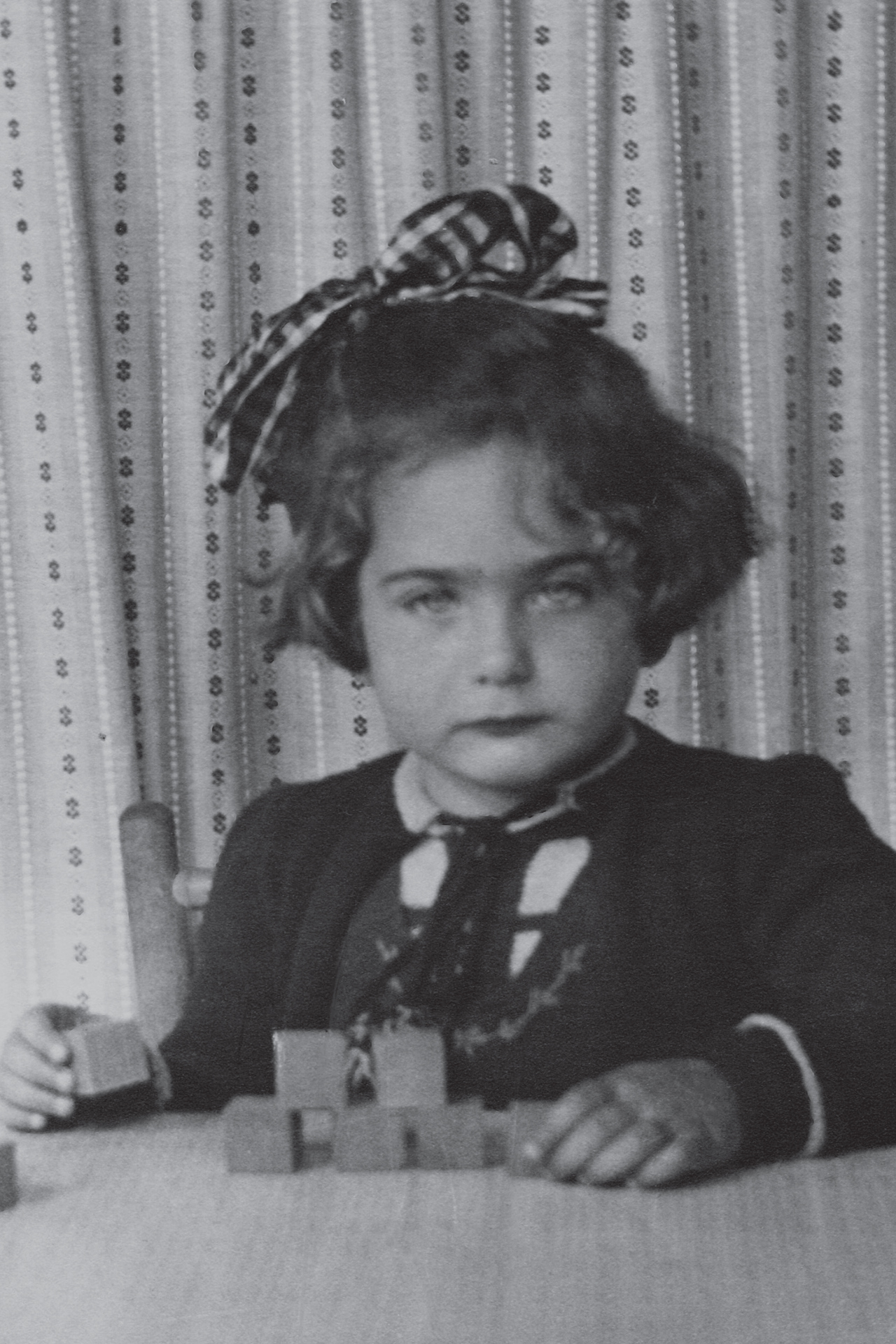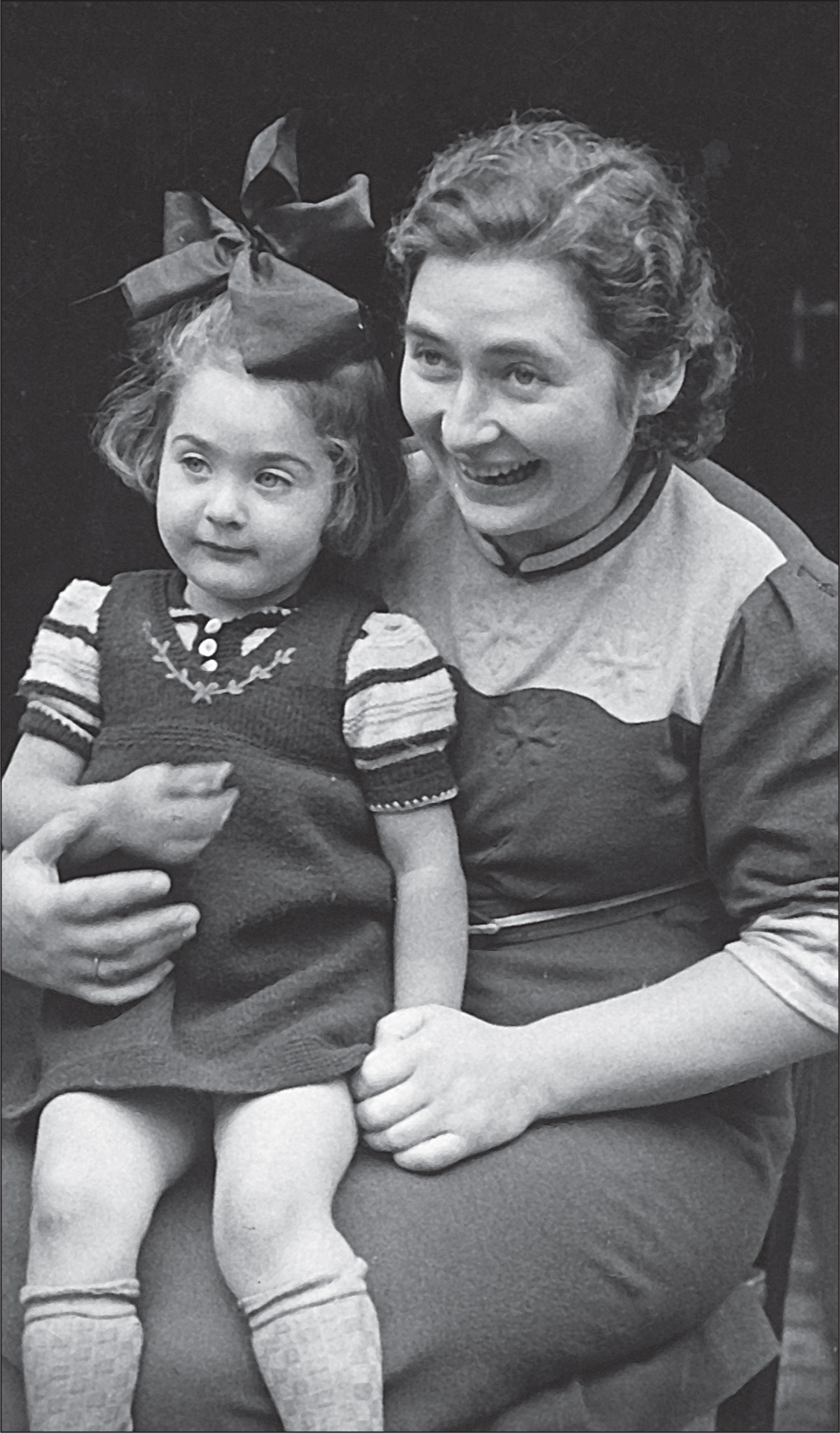

Leni in nursery class, 1942
I can still remember having my tonsils taken out. It was 1941 and I was three years old.
They gave me a white basin to hold, with two handles and a blue rim. I was wearing a brown rubber apron, which the nurses had pulled over my head. I placed the white basin on the apron. Then the doctor came in and he started cutting away with a kind of salad fork and spoon. I don’t remember the rest of the operation, or even the pain. What I do remember is having to spend the night in the hospital and sleeping in a crib with wooden bars. I needed to go to the bathroom during the night. They put me on a bedpan, one of those old-fashioned chamber pots. It was awful. My parents weren’t allowed to come in to see me because of the risk of infection. Someone gave me a doll. I thought it was a nurse who gave it to me, but I later found out that it was from my grandmother. That’s my first memory. I was truly alone, and there was no one to comfort me.
Before the war, my father had a kosher34 butcher’s shop. Like the other Jewish butchers in the village, he only sold beef, while the three other butchers in Neede sold pork. After the war, that all changed. The other butchers started selling beef, so my father had to sell pork too. My mother once told me later that she tried to keep Shabbat, but we often had to wait so long for my father that we fell asleep over our food.
For me, being Jewish was all about the feeling of security that my grandmother gave me. She was a large woman, and she used to wear a dress with a big silver brooch pinned to it. I loved sitting on her lap. That dress was very special to me. It was such an unusual shade of brown, a sort of dark bronze color, and it seemed to radiate warmth. I’ve never seen that kind of brown since.
When we went into hiding, my grandparents didn’t want to go with us. “We’re not leaving Neede,” they said. “We’ve lived here all our lives.” They were taken from the house soon after that and murdered in Sobibor on May 14, 1943.

I don’t actually remember anything about the war until the point I went into hiding, in early September 1942. I was four and a half years old. My younger twin sisters, my six-week-old brother, and my parents went into hiding at the same time — all of us in different places.

Leni with her mother at the beginning of 1942
On August 25, 1942, my father was told to report to a labor camp. He was planning to go, because he said that work never killed anyone. The authorities let him off for a few weeks because of the birth of his son. Someone from the resistance advised him to go into hiding. They had addresses of safe houses for us. My parents followed the advice.
The hairdresser in Neede, Mr. Grunnekemeijer, came to fetch me. He took me to Enschede in a black car.
“Did you cry when I left?” I asked my mother later.
“No,” she told me. “That would only have made it more difficult for you.”
Mr. Grunnekemeijer stopped the car and said, “You have to get out here.” We were on a bridge. I thought it was strange that there was no water under the bridge, just trains passing through. “Walk down that way,” he said, pointing. “Then you’ll come to a house. That’s where you need to go.”
I walked down and rang the bell. A very kind man opened the door. He took me to the kitchen and gave me something to drink. I remember the red-and-white curtains at the windows. It was just like Hansel and Gretel’s house.
Later I found out that the kind man was Reverend Overduin. Reverend Overduin was in the resistance and all throughout the war he looked for places where Jews could go into hiding.
After a while, a woman came to the house. I immediately took a dislike to her, but I had to go with her. She had five children, and I was the sixth child in the house. I was a dark-haired little girl, and my eyebrows met in the middle. They must have thought it made me look too Jewish, because almost as soon as I got there, they shaved the space between my eyebrows, without explaining anything to me. I felt as though I’d lost my identity somehow.
On Saturdays, Aunt Nelly used to give us a good wash. That’s what I called her: Aunt Nelly. I never called her Mother or Mommy. She washed us in the kitchen. They didn’t have a shower. She made me stand on a yellow kitchen chair. I still detest yellow chairs even now. Before she started scrubbing me, she slapped me so many times that I was black and blue until the following Saturday.
I’ve never been a fast eater. Aunt Nelly used to take my plate away halfway through the meal, saying that I obviously didn’t like the food. Then she would give it to her son, who was ten years older than me. We got a cup of milk to drink with our food, but she used to top up my milk with tap water.
“Why do you always add water to my milk?” I asked her one day.
“I don’t,” she said.
“But I saw your hand going under the tap with my cup.”
“No, you didn’t.”
Even after I’d caught her at it, she still kept topping up my milk with water. She didn’t make any effort to hide it. I thought it was very odd that adults could fib like that.
One time, all of us children became sick, and Aunt Nelly put us all in one room. When we had almost recovered, we got rowdy and we started horsing around on the beds and broke one of the springs. I immediately got the blame, without Aunt Nelly even making an attempt to find out who’d been jumping on the beds. As punishment, she sent me into the hallway and made me stand on the granite floor in my bare feet. And keep on standing there. If I even thought about sitting down, she’d give me a good smack.
Aunt Nelly’s husband, Jan, worked a lot and was hardly ever at home. But I think he must have sensed that I was missing out, because he sometimes used to sit me on his lap and give me a hug. I liked that. It felt like he was protecting me.
I didn’t have an actual hiding place, but we once had some visitors who weren’t allowed to know I was there. Aunt Nelly rolled me up in a piece of carpet and then leaned it up against the wall of the storage room. It was really cramped. I could barely move and my legs were really tired. Then I got cramps and I was terrified that I wouldn’t be able to keep it up and that I might even fall over. It seemed to take forever before they came to unroll the carpet and I was free again.
In the family’s dresser there were passport photos of my parents, which had been taken for their identity cards. I have no idea how they got there. Whenever I was having a really bad time, I used to sneak a peek into the dresser and hold the photographs for a moment.
In 1944, Aunt Nelly became pregnant again. I had to leave the house around the time of the sixth child’s birth. They found a place for me with a doctor in the village of Enter. They were an elderly couple who also belonged to Reverend Overduin’s congregation. It was like heaven: They didn’t beat me, they didn’t snatch my plate away, they didn’t water down my milk, and they didn’t make me stand on the ice-cold floor.
The war had also reached Enter, of course. I didn’t know the word raid, but one day it became clear that I wasn’t safe. The couple took me up three flights of stairs to a bedroom. Then they removed the bottom of the closet and I had to go back down another three flights of stairs to a room that was full of all kinds of girls’ toys, which had belonged to their daughters. “You mustn’t ask any questions,” they said. “And you mustn’t shout. We’ll come fetch you when everything’s safe again.”
After sitting in that room for hours, I desperately needed to pee. But there was nothing that looked like a potty. So I found a yellow duster. I put the duster on the floor and I peed on it. The strange thing was that they weren’t even angry when they came to get me. In fact, they even praised me for using the duster.
I once went with the man — I can’t remember now what I used to call them — to pick nettles to make soup. We were both wearing gloves and he took me by the hand. I remember feeling calm and contented.
I also went to school in Enter. It was a religious school, but I don’t remember much about it. I don’t even know if I still had my own name. I do remember thinking it was crazy that things were just going on as usual: children walking to school, adults going to the movies or out dancing. Why should I be afraid when other people were just getting on with their lives?
Later, toward the end of the war, I had to go back to Aunt Nelly’s house in Enschede. I was packed off like a parcel. The house was next to a park with a tennis court. One day, on the other side of the park fence, I saw a girl who was also on her own. I walked up to the fence, we talked for a while, and we played with those white berries that burst when you squeeze them.
When I saw my twin sisters again after the war, I suddenly remembered the girl from the park. Without knowing it, I had been playing with my little sister Mary. She was in hiding with “Aunt Bep” and “Uncle Bram,” a young childless couple who often used to play tennis in the nearby park. I’d always seen my sisters together before the war, so I didn’t recognize her when she was on her own.
After the liberation of Enschede, in April 1945, I wanted to go straight to my parents. That wasn’t possible though, because they were in Apeldoorn, which wasn’t liberated until some weeks later.

My parents went into hiding in a forest at first, in a henhouse. “We could cackle fine, but we weren’t too good at laying eggs,” my mother used to say. It became too dangerous in the forest, so they went in an ambulance to Apeldoorn, where they spent the rest of the war. The people who took in my parents treated them very badly. Whenever they ate meat, they used to throw my parents the bones. They were sheltering people for the money the resistance gave them.
Being back with my parents didn’t feel at all strange. I could still remember exactly what our house looked like, where the spoon rack was in the kitchen, where my doll’s baby carriage stood. I was the only one of the children who remembered our parents. My sisters are still jealous that I can remember so much about that period. When I got older, I was surprised by the large number of memories and mental images I have from when I was a little girl, particularly because I remember absolutely nothing about the next few years, from the age of seven to twelve.
Those first few months after the war were hard for my parents. They suddenly had four children in the house, three of whom were crying, “I want to go back to my mommy.” “You’re crazy,” I used to say to them. “You’re with your father and your mother.” My little brother was six weeks old when he left and three when he came back. Sometimes my mother used to say, “The boy meant nothing to me.” Later there were remarks such as “just like his dad” or “a dead ringer for his grandpa,” but at first that little child was a stranger to her.
I found it hard to become attached to people after the war. During the war I’d often longed for my parents, but once I was back at home I realized that something was broken. My mother was no longer able to make me feel safe and loved. When I had my own children, I found it very difficult to cuddle them at first. I never really used to hug my friends and family either. But at a certain point, I just decided that I should get used to it, because I realized that people liked it. That brought back some of the feelings of warmth and security, but affection was something that I had to relearn.